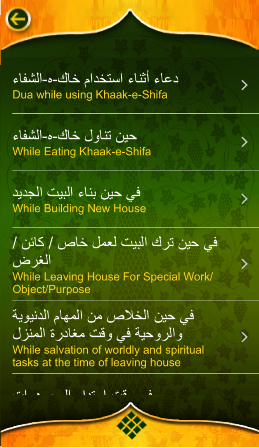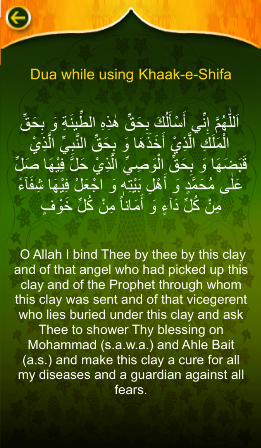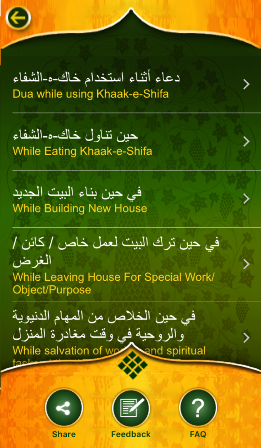


Read and recite the Duas for daily life events such as going for an interview, before eating food etc. Duas are extracts from Koran which helps you remain blessed with the blessings of Allah. For any Islamic follower these Duas are a must to attain Jannat.

Each Dua has an English translation from Arabic so that you get the meaning of Dua. Duas in English translation helps you know the core of the meaning of that particular salat. May Allah bless all of us! Coming shortly where you can also listen to Dua and that too in the voice of famous Qazi/Maulwi.

You can share any Dua with your friends and loved ones through social media by pressing on share button. Ibadat app lets you share the good thoughts of Islam that helps them get connected with Allah. Themuslimsapp.com is a website that gives you holy Quran with translation in English, holy Quran with translation in Russian, holy Quran with translation in Malay, holy Quran with translation in Indonesian, holy Quran with translation in Turkish, holy Quran with translation in French, holy Quran with translation in Arabic, holy Quran with translation in Persian, holy Quran with translation in Urdu, holy Quran with translation in Ukrainian, holy Quran with translation in Bangla and many other languages.
There is a special emphasis on du'a in Muslim spirituality and early Muslims took great care to record the supplications of Muhammad and transmit them to subsequent generations. These traditions precipitated new genres of literature in which prophetic supplications were gathered together in single volumes that were memorized and taught. Collections such as Al-Nawawi's Kitab al-adhkar and Shams al-Din al-Jazari's al-Hisn al-Hasin exemplify this literary trend and gained significant currency among Muslim devotees keen to learn how Muhammad supplicated to God.
However, Du'a literature is not restricted to prophetic supplications; many later Muslim scholars and sages composed their own supplications, often in elaborate rhyming prosethat would be recited by their disciples. Popular du'as would include Muhammad al-Jazuli's Dala'il al-Khayrat, which at its peak spread throughout the Muslim world, and Abul Hasan ash-Shadhili's Hizb al-Bahr which also had widespread appeal. Du'a literature reaches its most lyrical form in the Munajat, or 'whispered intimate prayers' such as those of Ibn 'Ata Allah. Among the Shia schools, the Al-Sahifa al-Sajjadiyyarecords du'as attributed to Ali and his grandson Ali ibn al-Husayn Zayn al-'Abidin.
Dua is essentially an expression of submission of faith to God and of one's neediness.
Type I: Du'a al-mas'alah, or the 'du'a of asking.' This type of du'a is when one asks for the fulfillment of a need, or that some harm be removed from him/her. An example would be when a person asks, "O God! Grant me good in this world, and good in the next life!"
Type II: Du'a al-'ibadah', or the 'du'a of worship.' This type of du'a represents a very broad concept. In Islam, every single act of worship includes this type of du'a. Examples would include when a Muslim prays or gives zakāt or fasts.
Du'a can also be divided into two broad categories depending on what is being asked. These two categories include religion and the world. Examples of making du'a for religion would include things such as if a Muslim asked God to increase their faith or ask God to forgive them for their sins. Examples pertaining to the world would include things such as if a Muslim asks God for an increase in wealth, to be cured from a disease, or to be granted more children.